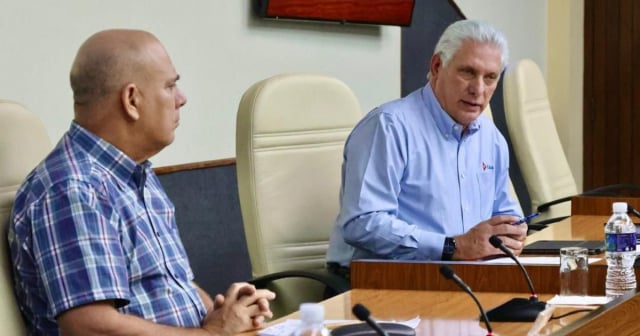Twenty years have passed since Fidel Castro launched with great enthusiasm what he called the "Energy Revolution" in Cuba. It was presented as the definitive solution to the country’s energy problems, a project aimed at reducing dependence on imported oil, modernizing energy infrastructure, and promoting the use of renewable energy. However, two decades later, the outlook is bleak: Cuba is currently facing an absolute crisis in the energy sector that seems deeper than ever.
Twenty years have passed since Fidel Castro launched with great enthusiasm what he called the "Energy Revolution" in Cuba.
The initial enthusiasm was based on measures with quick impact: the replacement of inefficient appliances, the massive use of energy-saving light bulbs, and the distribution of diesel generators throughout the country to ensure the electricity supply. However, the underlying structural problems were ignored or insufficiently addressed. The large-scale thermoelectric plants, mostly built with Soviet technology in the 70s and 80s, continued to deteriorate without an effective renewal plan. Instead of new investments in long-lasting infrastructure, palliative solutions were chosen that, while allowing for temporary stabilization of supply, created a costly and inefficient dependency on diesel generators.
The generators, presented as a milestone of distributed generation, have turned out to be a sinking lifeline. Fueled by imports that the country needs to purchase at high costs and with nearly 20 years of almost continuous operation and inadequate maintenance, their operation has become unsustainable. The constant blackouts, which have been part of daily life for Cubans for several years now, are the most visible symptom of a crisis that can no longer be hidden. Families face daily power outages lasting several hours, affecting both the quality of life and the already fragile local economy.
Large-scale thermoelectric plants, mostly built with Soviet technology in the 1970s and 1980s, continued to deteriorate without an effective renovation plan.
Mass blackout of October 18, 2024:
On October 18, 2024, Cuba suffered a massive blackout due to the total disconnection of the National Electroenergy System (SEN). The interruption occurred after the Antonio Guiteras thermoelectric plant went offline, which, according to the Ministry of Energy and Mines, happened at 11:07 am. The situation left millions of people without electricity, and although the authorities assured that they were working on restoring the service, they admitted that "there is no defined time to restore the service."
The blackout severely affected the entire country, causing chaos. The supply has only been restored in circuits that feed critical hospitals. In Havana, the blackout even affected the José Martí International Airport, which was left completely in the dark. Although generators were used to maintain operations, images shared on social media raised doubts about whether the power backup was sufficient to ensure flight safety.
The crisis also affected connectivity on the island. The monitoring company NetBlocks alerted about a significant drop in Internet traffic, directly linked to the disconnection of the Guiteras plant. This impacted both individual users and institutions that rely on connectivity for their operations.
On October 18, 2024, Cuba experienced a massive blackout due to the total disconnection of the National Electroenergetic System (SEN).
The promise of transitioning to renewable energy has also not been fulfilled. Although ambitious plans were announced to install solar and wind farms, the reality is that the contribution of these sources remains marginal. Renewable energy projects, often dependent on external financing, have been delayed or implemented partially, without the capacity to offset the crisis of traditional plants. Instead of reducing dependence on oil, Cuba has increased its vulnerability, especially in the face of fluctuations in the international market.
Twenty years after the start of the so-called "Energy Revolution," the result is a wobbling energy system. Key infrastructures are on the brink of collapse, and the lack of investment has perpetuated obsolescence. The energy crisis is not just a technical problem; it is a reflection of a policy that failed to build sustainable solutions, instead relying on temporary measures and grandiloquent speeches.
The energy crisis is not just a technical problem; it is a reflection of a policy that failed to build sustainable solutions.
But the energy crisis is just one facet of a much larger problem. The current situation in the electricity sector reflects the systemic crisis of the Cuban economic and political model, which has failed to evolve and remains stuck in the past. The continuity promoted by Miguel Diaz-Canel is merely continuity of misery and deterioration.
Cuba lost twenty years in the energy sector; during this time, it did not invest in a real modernization of its infrastructure, did not install more modern and advanced power plants from allies like China or Russia (which even provided funding and loans), nor did it develop solar farms with Made in China panels. None of this would be affected by the U.S. embargo, the permanent justification. Cuba remained anchored to the past due to a political and economic system as obsolete as its power plants built with technology from the Soviet Union.
The country needs much more than patches and emergency solutions. The transformation that Cuba needs involves recognizing that the current system does not work, that a country cannot be managed like a military camp, and that Cubans deserve to live fully and not merely survive, as if they were in a constant state of war. The lack of vision to invest in a sustainable energy future reflects the same lack of vision to transform the economic and political system that has stagnated the country. The need for change is not only in the energy sector but at all levels of the state's structure, in order to offer its population a future with more stability, progress, and well-being.
What do you think?
SEE COMMENTS (2)Filed under:
Opinion article: The statements and opinions expressed in this article are the sole responsibility of its author and do not necessarily represent the viewpoint of CiberCuba.
